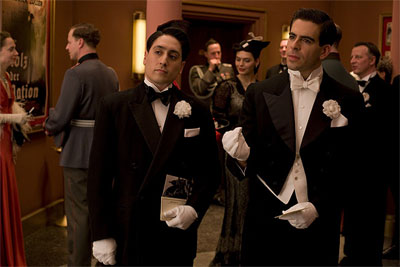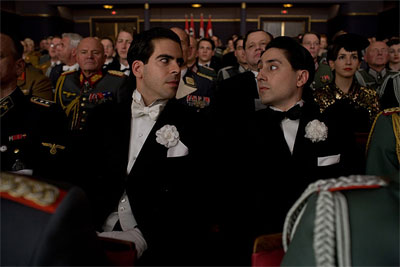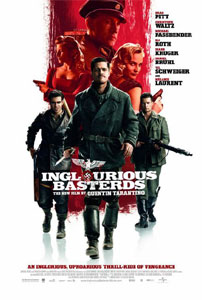Eli Roth Inglourious Basterds Interview

ELI ROTH- FROM DIRECTOR TO A REAL BASTERD.
EXCLUSIVE Eli Roth, Inglourious Basterds Interview by Paul FischerBetter known as the director of horror pics, Eli Roth can now add actor to his extensive repertoire, ass he plays a baseball-wielding member of Quentin Tarantino's Inglourious Basterds, a Jewish Nazi hunting group that goes after and brutally murders Nazis during World War 2. The film offers a fantasy view of history, and that, Roth says, is parts of its appeal, as he explained to Paul Fischer in this exclusive interview. WARNING: SPOILERS AHEAD.
QUESTION: What did you think when you first read this? Did you see it as being just a pure, fantasy version - a skewed version of history? I mean, what was your impression when you read -
ELI ROTH: I loved it. I mean, Quentin had read it to me in pieces. When he first read Hostel, I had gone over to his house, and we talked about the script and at the end of the day, he's like, "Hey, do you want to hear a scene from Inglourious Basterds? And he wound up reading me all of Chapter Two, with Hitler and the Bear Jew, and the - I just thought it was brilliant. I said, "Quentin," you know, "I'm from Boston. And everyone in Boston has a baseball bat with them." Most of the time it's used off the field. You put it in your car. It's for - if someone honks at you, you pull out your bat. So, that - you know, I thought it was such a great idea. And the dialogue was so brilliant, I thought it was the best writing he'd ever done. And then as he was writing the script, he would call me when he finished a chapter and read it to me. And I just - he read me the farmhouse scene. I had never heard Quentin apply his dialogue to this kind of subject matter. And the fact that he makes it - you know, a fairy tale, and a work of fiction, I love. Because I'm so tired of these so-called "accurate" historical movies, where you have these British people speaking with a German accent. It just drives me crazy. You know, how accurate was that? And Quentin actually has the respect to have people speak in their native tongue.
QUESTION: Well, on the one hand he does have that and on the other hand, he has Hitler and everybody destroyed by the end of the movie.
ELI ROTH: Yes. Yes, he does. And what's great about that is that he allows you to draw your own associations with it. He doesn't tie it to this one event that really happened. He makes me think about how after September 11th, I wished I had been on those planes, and had crashed it to kill those highjackers. And that's something very, very - by fictionalizing the film, Quentin tapped into something very real, which is that very real human wish, this feeling, this emotion, of wishing you could back in time and sacrifice yourself to stop evil and save thousands. And that's something that's incredibly real, and incredibly relatable. And the fact that he does it through characters that are real characters, and not just stock, cartoon movie characters, and not things that just yell, "Shnell, shnell, passport, passport," makes the film much more relevant. Even though it's set in World War 2, it's very relevant and much more contemporary.
 QUESTION: Is it freeing for you as an actor to play a character like this? I mean, are there any rules to go by?
QUESTION: Is it freeing for you as an actor to play a character like this? I mean, are there any rules to go by?ELI ROTH: Well, there are many rules. I mean, you're following a script. And everything that you do is informed by what's on the page. And Quentin has thought about these characters for years. And - you know, to play this part, I dropped my directing career. I did everything, and gained 40 - I put on 40 pounds of muscle, and I went back to Boston, where I grew up, and only talked in my accent, and really researched the role, and talked with the Jewish World War Two veterans from Boston. And - you know, I gave it everything I had. So, it was actually much more exhausting and draining in a way that I never imagined, you know? I knew that I had to look physically imposing. But, what was going to make the Bear Jew a classic character, what was going to make him real, was if people saw that pain and anguish and fury in his eyes. And that was going to - and I'd studied acting, and directed actors and know how to act, but I'd never pushed myself.
QUESTION: What do you go through in your own mind, as an actor, to present that kind of visual performance, where you do have to exhibit - because he doesn't say a lot, but he does a lot with his eyes, and he does a lot with his body language.
ELI ROTH: Yeah. Well, it's interesting, because all the scenes in Boston were just him talking non-stop. And when he's - before war has turned him into this animal. All the scenes were cut out of the film. And if Quentin does his prequel, he's going to use them in the prequel. So, there was dialogue scenes that we shot. But - you know, you have to basically dredge up the most painful experiences of your life, and make 'em feel like it happened 15 minutes ago. And that is a particularly skill you have to work at and hone. And it's very, very difficult to do that and maintain it, and do it repeatedly. And it's exhausting, and very taxing, and very difficult mentally. I mean, you just - you know, everyone else - I realized when I film, like, a kill scene in Hostel, a death scene, I'm so happy by the end of the day, because I know I've got my pieces to make the horror movie work. But when I'm shooting the scene of beating Rachtman to death, at the end of the day everyone else is going out for drinks. And even though the scene is fake, the stuff I'm thinking of is very real. And you just want to crawl in a hole and die. You're basically exposing yourself to the most vulnerable - making yourself vulnerable to the most painful experiences of your life, and opening up, in a way, for everyone in the world to see. So, it's a very - you know, it's an extremely painful process. But it's all worth it, when you're doing it for a project like this.
QUESTION: Does it change your perceptions, as a film director? I mean, even though you've acted before? You've done nothing like this.
ELI ROTH: Yeah, I wouldn't consider anything I've done like that. Even Deathproof, it was like - one take. No, this is the first time I've really pushed myself as an actor. And - it's definitely going to change how I direct. You know, I always understood, with Hostel, the torture scenes, I just let those guys - I gave them probably - several days, about a week off after they filmed their scenes just to recover from filming those torture scene. I know those was the most difficult scenes to shoot. But it's going to change the way I rehearse, and also the way I run my set.
QUESTION: You said that you dropped your director's hat pretty much all together while you were shooting this.
ELI ROTH: Well, I didn't. To prepare for the role. But once I got there - well, I told Quentin I would help him make can if he needed help. And then he called me a week later and said, "Get your ass on the plane. I need you to shoot Nation's Pride." So, Nation's Pride was three shots in the script, and I gave him 200 shots. And a 5 ½ minute - you know, Nazi propaganda epic. And he - I said, "This not only has to hang in there with Inglourious Basterds, this has to impress Hitler." So, I really, really pushed myself harder than I ever had. I was going seven days a week, 24 hours a day.
QUESTION: What were the challenges of shooting that? Because let's say - you have to basically replicate a black and white style of filmmaking that would have been typical of the 1940s, and in Germany of the 1940s.
ELI ROTH: Exactly. We watched those movies. And I had seen some Nazi propaganda films. I'm Jewish, so I grew up - you know, knowing about these movies, and familiar with that era of cinema. And Quentin and I watched movies together, to talk about the type of film he wanted. But he wanted a battle scene that would be glorifying Germany, and the swastika. And it was all about Zoller being the hero. And so we had to have a certain type of - style of acting, and it had to move at a certain pace. And the way the people were shot. And we talked about it. I said, "Do you want to see blood? Do you want to see squibs? Do we want to"- you know, we said, "No, let's do dust hits. Let's see people grabbing their chest when they get shot. Let's have that real sort of hammy style of acting." But I didn't want it to be a joke or parody. I wanted it to really - you know, it looks funny now compared to modern cinema. But I really wanted it to look authentic. I wanted people to think that this could have actually been - if people didn't know that I directed it, if they didn't see Daniel Bruhl in it, they would think that this was footage from a real movie. And actually, a number of people yesterday thought that I had taken footage from old film, which is the highest compliment. You know, it was great to shoot in black and white, and the 1 to 3 aspect ratio.
QUESTION: So did you shoot in black and white?
ELI ROTH: No, we shot everything black and white. Jol Brickmer this terrific DP who just shot Terry Malick's last film shot it. And we shot in black and white. It was so much fun. And we - you know, Quentin said, "Maybe it'll be, like, three days and a couple soldiers." And I said, "Give me two days and two cameras. And I'll fly over my brother, Gabriel," who is actually in one of the flashback scenes that got cut. "And Gabriel will operate second camera and I'll set him up as my second-unit director. And we'll be a block apart from each other, and we'll just tag team running the soldiers back and forth as we're setting up our next shot." And we just went boom, boom, boom, boom. The first day, we got 65 camera set-ups. Second day, 70 camera set-ups. And Quentin was so happy that I'd given him two hours of footage, he gave me a third-because the third day, he was going to do with Daniel Bruhl. And he was like, "You take it. I can't do it. Inglourious Basterds is taking everything I've got. And I've got to get through La Louisiane. So - you know, I just need you to shoot - why don't you shoot the third day with Daniel." And then I shot it, and I said, "Dude, I'll cut the movie." And he's like, "Great." So I cut the film. And then when we're filming the scene, we're interrogating Diane Kruger, I was - you know, I was wrapping at 8:30 or 9, and then sound mixing at night 'til 3:00 in the morning. So, I gave it everything I had, seven days a week, until by Christmas I had the finished 5 ½ minute print for Quentin. And it really helped him plan. He hadn't shot Chapter Five yet, which he knew was going to be his most cinematic chapter. All the fluid camera moves, mostly, were in that chapter. And he - and Quentin - finally, he was able to visualize, and help piece together - "Okay, when Marcel locks the doors, we see this. When he goes behind the screen, we see this. When Shunt [?] changes the reels, it's this." He had that movie in his head now. So it really was like a big thank you letter to Quentin.
QUESTION: How much more of that material will be on the DVD, do you know?
ELI ROTH: It's 5 ½ minutes. I mean, there's probably 30 seconds in the movie, or 45 seconds. But he's going to put the whole thing on the DVD. It's not a coherent short. It's meant to look like pieces of a feature, broken up over 2 hours.
QUESTION: It must have been very creatively gratifying for you to be able to both act and play a role like the Bear Jew, and direct something as challenging as this section of material, that people assume everything was done by Quentin. I mean, that's incredible.
ELI ROTH: Yeah. It was the hardest I've ever pushed myself. But, you know, Quentin - when Quentin has faith in you, and when someone has faith in you and inspires you to dig deeper than you've ever dug before. And I'm just so happy with the way that fans have responded.
QUESTION: Okay, let me ask you a couple of very quick questions before you go. Do you push yourself that hard in Piranha 3-D?
ELI ROTH: Well, yes. And in fact, I called Quentin after. I said, "Quentin, this is the greatest experience of my life. How am I ever going to top acting with Brad Pitt, and working with you?" And then Alexandre Aja calls and says, "Hey, do you want to host the wet t-shirt in Piranha 3-D?" I just called, I said, "What time do you need me?" And I called Quentin from the set, and I'm like, "Look. There's this other director I like working with better." And I sent Brad Pitt a picture of me hosing down all the naked tits, and I said, "This is real acting. Take a good look."
QUESTION: What about directing? Hostel 3 no, right?
ELI ROTH: I have nothing to do with that.
QUESTION: And what are you going to direct next?
ELI ROTH: In my sci-fi movie, Endangered Species.

Inglourious Basterds
Starring: Brad Pitt, Eli Roth, Diane Kruger, Melanie Laurent, Til Schweiger, Samm Levine, B.J. Novak, Daniel Bruhl, Michael Fassbender, Julie Dreyfus, Christian Berkel, Richard Sammel, August Diehl, Michael BacallDirector: Quentin Tarantino
Genre: Action/Adventure
Inglourious Basterds begins in German-occupied France, where Shosanna Dreyfus (Mélanie Laurent) witnesses the execution of her family at the hand of Nazi Colonel Hans Landa (Christoph Waltz). Shosanna narrowly escapes and flees to Paris, where she forges a new identity as the owner and operator of a cinema.
Elsewhere in Europe, Lieutenant Aldo Raine (Brad Pitt) organizes a group of Jewish soldiers to engage in targeted acts of retribution. Known to their enemy as "The Basterds," Raine's squad joins German actress and undercover agent Bridget Von Hammersmark (Diane Kruger) on a mission to take down the leaders of The Third Reich. Fates converge under a cinema marquee, where Shosanna is poised to carry out a revenge plan of her own...
MORE
- Viggo Mortensen The Road
- 24 Cast Reunion
- Aaron Eckhardt No Reservations
- Aaron Eckhart The Dark Knight
- Adam McKay Step Brothers Interview
- Alan Alda Diminished Capacity Interview
- Alan Alda Diminished Capacity Interview
- Alex Dimitriades
- Al Pacino Oceans 13
- Alan Rickman Snow Cake
- Alan Rickman Sweeney Todd



